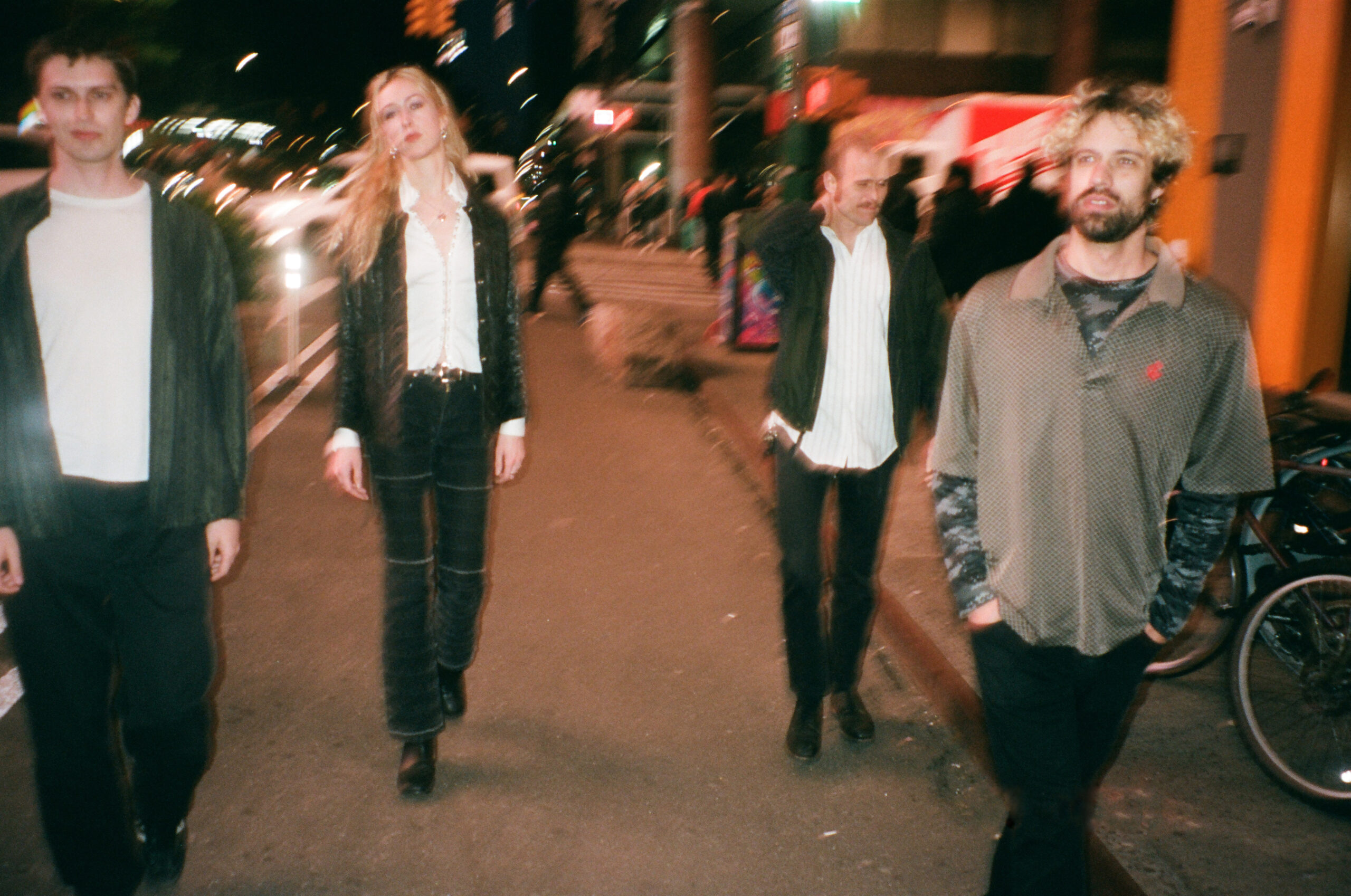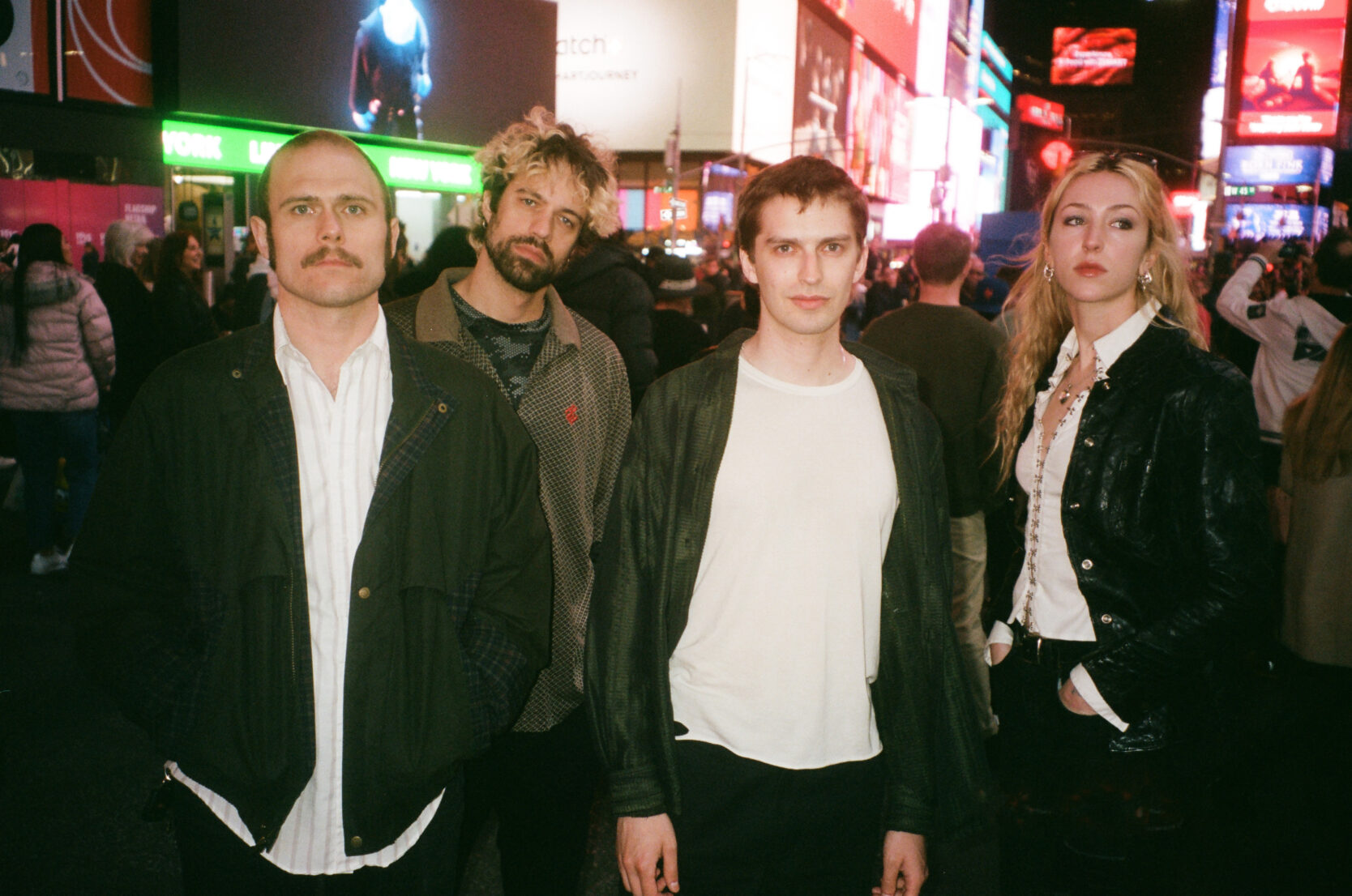Indie rock fans tend to romanticize “growing up” as a time when they found music to foster an identity separate from the jocks and bullies who dominated their hometowns. This was certainly the case for Strange Ranger frontman Isaac Eiger, who jokes over Zoom, “In Montana, rave culture was just wook culture – dudes doing molly in the woods listening to STS9 or whatever. And I just wanted to listen to Modest Mouse and have nothing to do with that at all.”
But real maturity is transcending the narcissism of small differences and accepting what you have in common with the people upon whom you once looked down. Like Eiger, Fiona Woodman grew up in the Pacific Northwest too introverted to experience raves firsthand. “I had nostalgia for a time that I never got to experience,” she admits. “I loved that movie Go in high school.” And now, they realize that everyone they grew up with was just looking to chase some kind of euphoria, or at least an escape from their teenage selves. After all, Eiger recalls that he’d heard about these woodland parties from his lifelong friend and Strange Ranger bandmate Fred Nixon.
The indie kids, hippies, and ravers are all liable to find something to like about Strange Ranger’s hallucinatory fourth album Pure Music, though it doesn’t really sound like Modest Mouse’s “3rd Planet” meets the Disco Biscuits. Rather, Eiger and Woodman agree that it’s a return to the spirit of their earliest incarnation as Sioux Falls. Released under that prior name (which was changed to Strange Ranger upon recognition of the offensiveness of “Sioux” to indigenous people) 2016’s Rot Forever was a 73-minute behemoth of Up/K Records fanfic, sounding a lot like early Modest Mouse (when the songs were longer than five minutes) or early Built to Spill (when the songs were under four).
Strange Ranger is now split between New York and Philadelphia and has honed a sound honoring both its members’ individual tastes for U.K. electronic weirdos and its collective status as a seasoned American indie rock quartet. Rot Forever and Pure Music are unrecognizable as the work of the same band, but Eiger believes both are the product of what’s called Beginner’s Mind: a willingness to set aside self-consciousness and run the risk of public failure.
Eiger says “There’s something fun about listening to your first tries at something before you have any competency,” whether it comes from watching stand-up comics in their raw infancy or even revisiting the Velvet Underground’s early catalog. “It’s important to stay in touch with sucking, or not being able to copy something exactly,” he elaborates. “I don’t want to make a Disclosure song like, ‘Wow, this is perfect.’ I want it to sound kinda janky.”
To its credit, nothing on Pure Music sounds like it’s meant to occupy the same H&M playlists or Ibiza DJ mixes that “Latch” and “White Noise” have dominated for the past decade. Strange Ranger’s dance influences ring true, but this isn’t music meant to be experienced in a club – rather, the hazy production, interspersed YouTube clips and porous arrangements replicate listening to Night Slugs or Hyperdub projects while sleepless scrolling through Twitter.

Eiger and Woodman namecheck Dean Blunt and Nourished By Time as their contemporary influences – artists who operate on the outer edges of pop by evoking “a lot of different eras, or an era that wasn’t real.” Pure Music similarly expresses a nostalgia that can’t be satisfied by one specific time period, but rather the excitement of whenever rock and electronic dance music were mingling anew. The drum loops evoke late-’90s trip-hop but also early Madchester. There are hints of ‘80s yacht rock and also the chillwave that sampled it as source material: “bedroom pop” as it might be understood by 30-something fans of Wild Nothing or the Radio Dept., or teens who associate the term solely with Bandcamp uploads.
It’s a distinct shift from previous Strange Ranger albums, which were always a snapshot of a distinct time and place. 2017’s Daymoon was its “Portland album,” one that scaled back on the epic song lengths for a more slowcore-indebted sound. Two years later on Remembering the Rockets, Strange Ranger had moved to Philadelphia and was aligned with the city’s prevailing tastes in late-’90s rock – a melting pot where Third Eye Blind and Built To Spill’s Keep It Like a Secret were held in equal esteem.
By releasing a new, different-sounding album every year, Strange Ranger had by now garnered a reputation as a prolific, shapeshifting, and quick-working band. But there were hints on Remembering the Rockets that it was growing unsatisfied with the limitations of indie rock, such as name-dropping Yves Tumor and Oneohtrix Point Never in interviews, even if their imprint wasn’t always felt on the music itself.
“I’ve never felt any loyalty to my past self, like, ‘I need to keep doing this because a very small amount of people liked it,’” Eiger explains. “We’re not making enough money to where that’s worth it.”
By the end of 2019, the band’s label, Tiny Engines, shuttered due to accusations of financial mismanagement. And then, you know, 2020 happened, which Strange Ranger embraced as an impetus to make its actual music match its professed inspirations.
“Guitar rock is something you do in a room with other people and we didn’t have access to that,” Woodman explains. She and Eiger put their learning curve with electronic production on display with the 2020 mixtape No Light in Heaven – a collage of abstract instrumentals and chipper synth-pop also serving as a calling card as they sought out a new label.

Eventually, they teamed with Fire Talk, the New York-based imprint whose roster is marked by cosmopolitan post-punk acts like Dehd, Deeper, and Mandy, Indiana and is more reflective of where Strange Ranger sees itself now after nearly a decade of emo adjacence. If not fully a New York album in geography, Pure Music reintroduced the band as New York in spirit, attracted and repulsed by a constant stream of content of which it is both creator and critic. Indeed, the group was remixed in 2022 by the Dare’s Harrison Patrick Smith, another Portland transplant who reinvented himself, albeit as an avatar of “indie sleaze.” “I heard you write about culture … “is that sort of like everything,” Eiger scoffs on opener “Rain So Hard,” a song he wrote in a South Philly apartment while “feeling confused about everything all the time.”
Though Pure Music is littered with recollections from Strange Ranger’s youth (interchangeable malls and schoolyards, the endless Interstate 90, Nintendo), it sees a pervasive sense of disorientation as the album’s unifying thread. “I feel like I never have any idea what the fuck is going on,” Eiger shrugs. “I’m totally aware that there’s going to be things happening in the culture that I don’t understand or have the right reference points for and the lamest thing you can do is be older and still making these dumb speculations and proclamations about the youths.”
In the same way, the rafter-reaching choruses of Remembering the Rockets allayed Eiger’s fears about parenthood and climate change, Pure Music is a hedge against the encroaching threat of cultural cynicism. The album takes its title from a line in “She’s on Fire,” a sort of thesis statement for Strange Ranger in 2023 – “I could die in pure music.” “We’ve always been attached to this idea of something being the most concentrated form of itself and leading to some kind of break that will blow you into this other level of transcendence,” Woodman explains. She sees “Dream,” one of Pure Music’s more definitively textural and rhythmic productions, as the band’s point of pivot. “It went on until the wee hours and kept going in a trance vibe,” she says. “We had so much fun and we wanted to keep creating that feeling again.”
Pure Music does tap into a more recent global movement, as once strictly guitar-rock bands shift towards a shoegaze/breakbeat hybrid where My Bloody Valentine’s “Soon” is the standard by which all music is measured (see: Oklahoma metal upstart Cursetheknife, Los Angeles’ Crushed, a buzzing duo featuring members of Temple of Angels and Weekend, and Pendant, whose 2019 debut Through a Coil was the final LP released during the first incarnation of Tiny Engines).
It’s perhaps a bit pat – though not entirely incorrect – to see this as a logical outcome of the pandemic. Most of the genres that thrived during lockdown were, paradoxically, those that typically required physical proximity to work; 2020 was an excellent year for both disco and screamo. “For me, there was a longing for that setting again, to be physically blasted by beats and bass,” Woodman says.
Eiger shares this desire, even if the relative “back to normal” circumstances of 2023 reanimate the same concerns the band has always harbored as a get-in-the-van touring outfit. “I want to quit music a lot of the time. I had a nervous breakdown basically the other day before our show,” he admits. “It does feel horrible putting yourself out there at all and you’re saying a bunch of embarrassing shit.”
At the same time, both Eiger and Woodman agree that the entire premise of Pure Music would ring false if it wasn’t subject to the risk of public embarrassment. “Nobody talks / the MC bombs / and I would die to be touched” is how Eiger describes what heaven must be like on the album’s penultimate track, “Fantasy.” “We’d be doing it even if no one was listening,” he says. “You still need the audience to make it real.“




